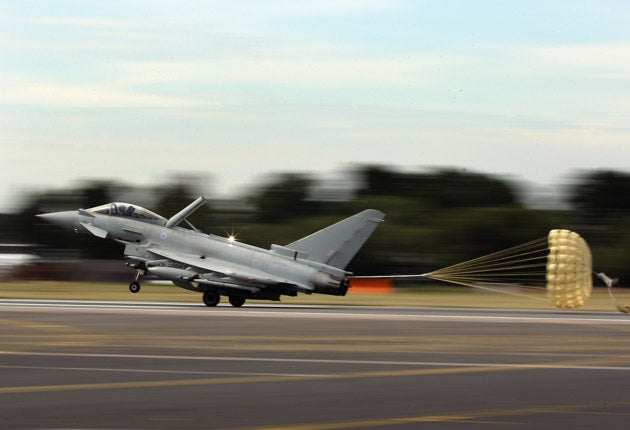Billions added to RAF typhoon costs

Your support helps us to tell the story
From reproductive rights to climate change to Big Tech, The Independent is on the ground when the story is developing. Whether it's investigating the financials of Elon Musk's pro-Trump PAC or producing our latest documentary, 'The A Word', which shines a light on the American women fighting for reproductive rights, we know how important it is to parse out the facts from the messaging.
At such a critical moment in US history, we need reporters on the ground. Your donation allows us to keep sending journalists to speak to both sides of the story.
The Independent is trusted by Americans across the entire political spectrum. And unlike many other quality news outlets, we choose not to lock Americans out of our reporting and analysis with paywalls. We believe quality journalism should be available to everyone, paid for by those who can afford it.
Your support makes all the difference.Billions of pounds have been added to the bill for Typhoon fighter jets due to bad planning and "over-optimism" at the Ministry of Defence, a spending watchdog said today.
Some 232 of the planes were originally ordered by the British government in the mid-1980s.
That number has since been reduced by 72, but the development and production costs have risen by a fifth to £20.2 billion, and support costs have also gone up.
Altogether the National Audit Office estimates that each individual aircraft is 75% - or £55 million - more expensive than originally anticipated and the total programme cost will eventually hit £37 billion.
The joint management deal with Germany, Italy and Spain has resulted in problems obtaining spares and meant the RAF has had problems fully training pilots.
While Typhoons are performing well in air-to-air missions - which could potentially include enforcing a no-fly zone over Libya - £564 million of work on adapting the jets for ground attacks is unlikely to be complete until 2018, according to the report.
NAO head Amyas Morse said: "The Typhoon is currently performing important operational tasks but the full multi-role capability won't be available for a number of years.
"Until this happens the MoD will not have secured value for money from its over £20 billion investment in Typhoon. MoD has put some of the building blocks in place to enable this to happen. But difficult and deep-rooted problems remain to be overcome.
"Our examination has shown that key investment decisions were taken on an over-optimistic basis; the project suffered from corporate decisions to try to balance the defence budget; and the department did not predict the substantial rate at which costs would rise. None of this suggests good cost control, a key determinant of value for money."
Defence Equipment Minister Peter Luff said the MoD and the Eurofighter consortium had learnt from past problems with the programme and that improvements had been made.
"The four partner nations are working hard together to ensure their project management continues to match the excellence of the Typhoon, which is a world-class, multi-role weapon system which meets the defence challenges of the 21st century," he said.
"The Defence Secretary has announced reforms to prevent future delays and cost overruns in Defence procurement, ensuring our armed forces are properly equipped and tax-payers get value for money."
Join our commenting forum
Join thought-provoking conversations, follow other Independent readers and see their replies
Comments